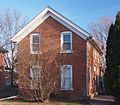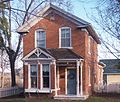Early Shakopee Houses
Early Shakopee Houses | |
 The Early Shakopee Houses from the south, with a modern garage between | |
| Location | 411 and 419 East 2nd Avenue, Shakopee, Minnesota |
|---|---|
| Coordinates | 44°47′54″N 93°31′18″W / 44.79833°N 93.52167°W |
| Built | 1865 |
| MPS | Scott County MRA |
| NRHP reference No. | 80002169[1] |
| Added to NRHP | April 17, 1980 |
The Early Shakopee Houses are a pair of houses located at 411 and 419 East 2nd Avenue, Shakopee, Minnesota, United States. They are listed on the National Register of Historic Places.[2]
The houses are built mainly of brick, which was quite common in Scott County, even for modest residential dwellings. These two houses, as with other structures in Scott County, were designed by local builders, not by well-known architects, but they show the influence of major architectural styles as interpreted by area residents and builders. The houses date back to about 1865, when the county was experiencing a phase of growth associated with the construction of railroads. The Minnesota Valley Railroad, later part of the Chicago, St. Paul, Minneapolis and Omaha Railway, built its line through Shakopee in 1865. Shakopee had been established as a river town in 1854, but the growth of railroad lines in the county accelerated Shakopee's growth. The Merchants Hotel and these two houses in Shakopee, along with the Hooper–Bowler–Hillstrom House and the Episcopal Church of the Transfiguration in Belle Plaine and several buildings in the Jordan Historic District in Jordan, were nominated to the National Register as examples of the development in the railroad boom era in Scott County.[3]
-
411 East 2nd Avenue
-
419 East 2nd Avenue
References
[edit]- ^ "National Register Information System". National Register of Historic Places. National Park Service. January 23, 2007.
- ^ Nord, Mary Ann (2003). The National Register of Historic Places in Minnesota. Minnesota Historical Society. ISBN 0-87351-448-3.
- ^ "National Register of Historic Places Nomination Form: Scott County MRA". July 1979. Retrieved 2008-09-03.
External links
[edit] Media related to Early Shakopee Houses at Wikimedia Commons
Media related to Early Shakopee Houses at Wikimedia Commons






